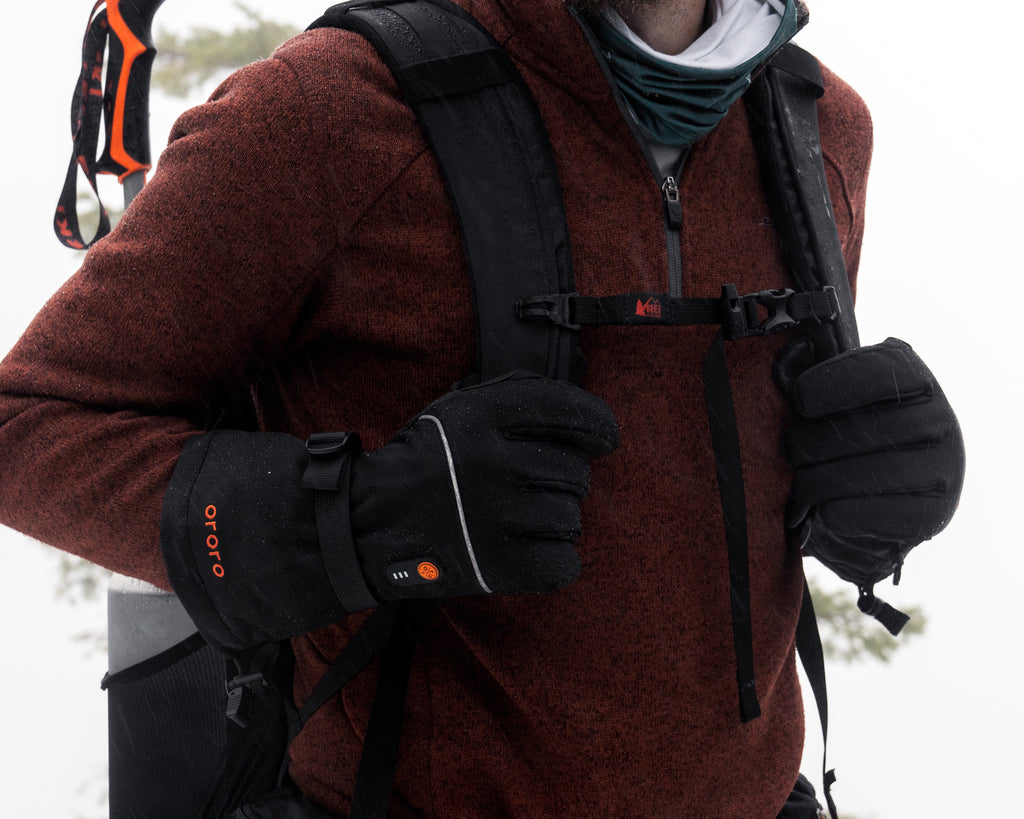5 Ways to Challenge Raynaud's

When walking through life, there’s times when we come across physical challenges that can hold us back from enjoying days to their fullest. For some, one of life’s biggest challenges is to deal with Raynaud’s disease. Whether we have the condition or not, we all need to be aware of its existence and October is a great time to learn more about it. It’s Raynaud’s Awareness Month.
---> Do you have Raynaud’s? We’ve got some tips that may help you out.
---> Don’t have Raynaud’s? We invite you to learn more, so you can understand and support those that have it.
So, keep reading! Let’s challenge life’s challenges together.
What is Raynaud’s?
According to the University of Nottingham, “Raynaud’s is a circulatory condition in which the small blood vessels constrict in response to the cold.” This keeps blood from reaching extremities and hence some body parts change colors. This can be painful and uncomfortable.
The consists mainly on three phases:
- Fingers turn white.
- Fingers turn blue.
- Fingers turn red when they’re re-warming.
There are two types of Raynaud’s:
Primary: The disease will show up by itself.
Secondary: It shows up together with other illnesses (like rheumatoid arthritis, lupus, autoimmune disease, besides others).
Who is affected?
- According to the Raynaud’s Association, 28 million people in the US are affected.
- 9 out of 10 are women.
- Mostly people who live in cooler climates.
- Primary Raynaud’s usually begins from age 15 to 25 in most cases.
- Secondary Raynaud’s can begin at any age, but usually shows up after 30.
When it’s triggered
If you have this condition, these are the two of the main triggers:
- Being exposed to low temperatures (cold temperatures, air conditioners, cold cans).
- Increased stress levels.
Where in your body?
It usually happens on hands and feet, but can also happen on the ears, nose, lips, and nipples.
How to Challenge Raynaud’s
The best way to challenge Raynaud’s is to prevent the attacks from happening. Please note that you should also visit your doctor. These are only some additional tips that could help you handle it easier:
1. Breathe and Calm the Mind
One of the main triggers of Raynaud’s is stress. According to VersusArthritis.org, “emotional changes, such as feeling worried, can also cause an attack of Raynaud’s by triggering the nerves to shut down the blood supply.”
Though sometimes we can’t avoid life’s challenges, there are small steps we can take to handle certain situations easier.
To reduce stress there are several techniques you can use, such as breathing exercises, mindfulness, yoga, or meditation. These activities can help you calm the mind, and therefore reduce stress. Something simple you can practice if challenged with a stressful situation is diaphragmatic breathing (breathing with your belly).

Here are some steps to follow from Healthline for diaphragmatic breathing:
- Sit straight on a comfortable chair or lie down on a flat surface.
- Place one hand on your chest and the other on your belly.
- Breathe in deeply through your nose. Your belly should expand and your chest should stay still.
- Breathe out through your mouth. Your belly should contract.
Keep inhaling and exhaling slowly for a few minutes. Feel better?
2. Help your blood circulate
Raynaud’s is a condition that can be worsened when there’s poor blood circulation. Some things you could do to improve your blood circulation are:
- Avoid caffeine, alcohol, and cigarettes, as these can have a negative effect on your blood circulation.
- Check your diet: According to Healthine, these are 14 foods that can help you increase your blood flow: Cayenne pepper, pomegranate, onions, cinnamon, garlic, fatty fish, beets, turmeric, leafy greens, citrus fruits, walnuts, tomatoes, berries, ginger.
Some recent studies have also found that Raynaud’s has a lot to do with a healthy gut and recommend a whole foods based diet.

- Move around: Exercise helps a lot when it comes to improving blood circulation, so make sure to add some movement to your daily routine (especially if you sit for long hours). Cardiovascular exercise, yoga, and even walking can help out.
3. Find Extra-Support
Dealing with Raynaud’s isn’t easy, but it’s easier when you feel supported. There are different kinds of support you can look for:
- Medical support: Seek for help from a trusted professional. This is very important.
- Emotional support: Mental health is important for your well-being. Talk to a mental health specialist if you need that extra-support to help you cope with any difficult situations.
- Community support: Sometimes others don’t really understand what we’re going through, except those who are experiencing similar situations. There are communities specially dedicated to discussing Raynaud’s where you can find that additional support that you may be looking for. You can find some online communities on Facebook, for example.

4. Challenge the Climate
The most recommended thing to do is to avoid cold temperatures. But sometimes they simply can’t be avoided. It's not easy to stay indoors for 6 months without ever going out.
We know you need much more than regular clothes: you need extra-warmth. That’s why we recommend the use of the ORORO 3-in-1 heated gloves. They’re great because you can adjust the temperature settings according to your needs. And you can take them everywhere! You can use them when being outdoors in cold temperatures, going to the supermarket, opening the freezer if there’s no one to help you, or even indoors when there’s a freezing AC. Need to use your phone in cold temperatures? There's no need to remove your ORORO gloves as their fabric is touchscreen sensitive!

|
Some are already challenging Raynaud’s with ORORO: “This morning I went outside and for the first time since I was diagnosed with Raynaud disease 7 years ago, I could stay more than 5 minutes outside without crying and it’s -20 degrees C !! Thank you ORORO.” Benoit B from Montreal, QC, Canada |
And of course, keep the rest of your body at the desired temperature with ORORO Heated Apparel, that has adjustable temperature settings. At ORORO you can find heated jackets, heated vests, heated parkas, and heated hoodies! There’s one for every style.
5. Spread the Word!
Share information about the disease so others can be aware of its existence.
- Share your story with others. You can share it on social with hashtags like #raynaudsawareness.
- You can also comment below and let us know about your experience. You never know who needs to hear what you have to say.
- And don’t forget to share this article!
Let’s Challenge Raynaud's together.
Want to support a friend?
Give the gift of warmth. Give your friend some kind warm words or if you want to surprise them get them some the ORORO 3-in-1 heated gloves!
Other articles you may like:
9 Ways to Protect Yourself in Cold Temperatures
Use information at your own risk: The information presented is intended for educational purposes only and is not intended to be a substitute for professional advice, diagnosis or treatment. Never disregard professional medical or home improvement advice. The information and suggestions should be discussed with a professional. You are responsible for independently verifying the information if you intend to rely upon or use it in any way. You use all information at your own risk.





1 comment
Do you have any heated gloves for men? I am a 54 yr old male (the other 1 out of 10 that has Raynauds). I like running and hunting and being outdoors in colder
Climates but starting to realize that these activities are becoming less likely if I can’t find something to keep my hands warm.